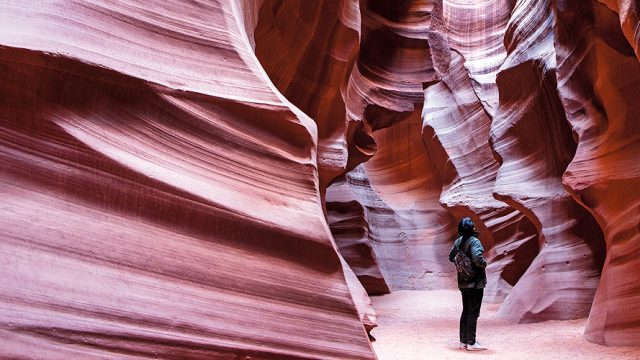Some of the most geographically diverse scenery in the United States can be found in its southwest corner. In fact, the dominating Colorado plateau has the largest concentration of national parks and scenic wonders in the world. Contrary to its popular image of a sprawling desert, it’s a red rock wonderland, shaped by earth and water over millennia. And among all the states in the region, Utah packs the meanest punch. Home to ‘The Mighty 5’, the five national parks are closely situated to each other.
On a driving-cum-hiking trip last winter with like-minded adventurists, I found myself roping in Utah’s five, the Indian Reservation at Monument Valley, the serene Lake Powell region, and the Grand Canyon in Arizona.
The region witnesses more than 300 sunny days in a year, almost guaranteeing good weather. The five national parks boast of many unique features. The Zion National Park’s main canyon is a green oasis covered by pines and junipers; its high sandstone cliffs fed by seeping springs and waterfalls. The high rim of the Bryce Canyon National Park is actually one face of a plateau that is slowly eroding away, leaving behind amphitheatres of coral-hued rock hoodoos. At the Capitol Reef National Park, a geologic wrinkle called the Waterpocket Fold extends for almost a 100 miles. Years of erosion has created one of the world’s highest densities of natural arches at the Arches National Park while at Canyonlands, the most remote among the five, the Colorado and its tributaries have carved flat layers of sedimentary rock into hundreds of canyons, mesas, buttes, fins and spires.
The Information
Getting There
I flew into and out of Phoenix, Arizona, though Las Vegas is a better option. There are no direct flights but multiple carriers fly from major Indian cities to Las Vegas.
Where to Stay
We stayed at Zion Lodge inside Zion Park (approx. ₹15,000; zionlodge.com); Best Western Plus Ruby’s Inn in Bryce Canyon (approx. ₹11,000; bestwestern.com); Capitol Reef Resort in Capitol Reef (approx. ₹8,500; capitolreefresort.com); The Gonzo Inn (approx. ₹17,000; gonzoinn.com) in Moab for forays into Arches and Canyonlands; The View Hotel in Monument Valley (approx. ₹16,000; monumentvalleyview.com); Lake Powell Resort (approx. ₹10,500; lakepowell.com); and at Bright Angel Lodge (approx ₹9,500; grandcanyonlodges.com) inside the park at the Grand Canyon.
Other Tips
I would definitely recommend an early winter trip (September to end November) with less crowds and cooler temperatures.
An international driving licence and an experienced co-driver are helpful if you wish to drive. Use the hop-on, hop-off shuttle service in Zion and Bryce.
Bike, bus and hiking tours are available. Check out the state parks website: stateparks.utah.gov.
While a lot of the scenery is right outside your window, roping in some of the long or short day hikes is a must. Each visitor information centre in the parks will provide free maps and guidance on the trails that are suited for you.
The $80 (approx. ₹5,500) America the Beautiful–The National Parks and Federal Recreation Lands Pass (recreation.gov) gives you access to parks in the US for a year.




